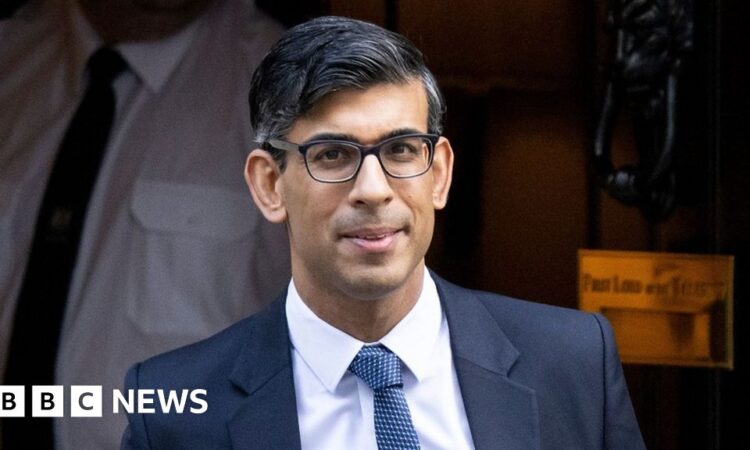
Labour has accused Rishi Sunak of allowing a culture of “lavish spending” in government
Labour has accused the Conservative government of overseeing “lavish spending” on hotels, hospitality and other costs using taxpayer-funded debit cards.
The bills have been highlighted in a Labour study of spending on government debit cards in 2021.
Examples of bills include £3,393 on 13 fine art photographs, and £23,457 on alcohol for UK embassies abroad.
The Conservatives branded Labour’s analysis a “political stunt”.
A Conservative Party spokesperson said Labour spent almost £1bn on the cards – known as government procurement cards (GPCs) – in 2009, when the party was last in government.
The spokesperson said the Conservatives cut the number of cards in use and introduced a requirement for spending to be publicly declared.
The £1bn of spending in 2009 was across the whole of the public sector, while Labour’s analysis focused on 14 government departments, so the figures are not directly comparable.
The Cabinet Office said the cards can save time and money when used for one-off purchases and are considered to be an efficient way of paying for goods and services.
But Labour’s deputy leader Angela Rayner said Prime Minister Rishi Sunak “has failed to rein in the culture of lavish spending across Whitehall on his watch”.
The cards were introduced by the government of former Labour prime minister Tony Blair in 1997 as a more convenient way to make low-value purchases.
They were made available to all public sector organisations, including central government departments, local authorities and the NHS.
The use of the cards has come under increased public and political scrutiny following a major scandal over expenses claims made by MPs in 2009.
In a report on GPCs in 2012, the National Audit Office said “there has been a lack of central oversight and control of the card, which has increased risks to value for money”.
In its study of the cards, Labour analysed spending data for every major government department in 2021, apart from the Ministry of Defence.
The party obtained some of the data in statements written by ministers in response to parliamentary questions asked by Emily Thornberry, the shadow attorney general.
The 14 government departments – including the Treasury and Home Office – spent about £145.5m using GPCs in 2021, compared to £84.9m spent by the equivalent departments in 2010-11, according to Labour’s analysis.
However, the analysis does not take into account inflation.
In a 24-page document, titled the GPC Files, Labour included examples of government spending, including:
- The Treasury buying 13 fine art photographs from The Tate Gallery for £3,393
- £344,803 of card expenditure by Foreign Office diplomats in 2021 under the category “restaurants and bars”
- The Foreign Office spending £7,218 on a reception for Liz Truss, when she was foreign secretary
- The Ministry of Justice paying £4,019 for 850 branded USB cables for staff taking part in a virtual conference
- The Department of Health spending £59,155 on items of stationery in March 2021, compared to £1,470 in the whole of the rest of the year combined
Labour’s deputy leader said her party’s analysis showed “a scandalous catalogue of waste, with taxpayers’ money frittered away across every part of government”.
Ms Rayner said a Labour government would “get tough on waste, with an Office of Value for Money upholding transparency and high standards for all public spending, including on government procurement cards”.
Labour’s full analysis of the government’s use of GPCs is due to be published later on Monday.






